The rise of the zero waste life
YOU’D never know it by looking at them, but young people like Lauren Singer and Erin Rhoads are not living like the rest of us.
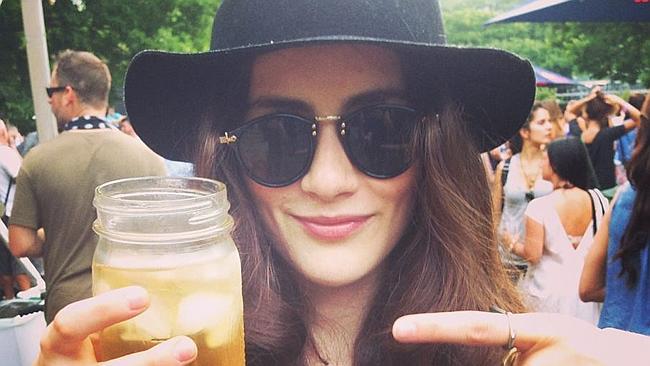
IF YOU think living your life without producing any rubbish is impossible, just ask the growing number of city-dwellers embracing the trend.
Living a completely rubbish-free life is difficult but some are managing to reduce their waste so dramatically that two years worth of rubbish can fit into a mason jar.
Melbourne resident Erin Rhoads is one of the growing number of people embracing the lifestyle, but you would never know it.
“I work in the CBD, I still wear heels, go out for cocktails, nothing has really changed,” Rhoads told news.com.au.
One of the things that has defined the modern zero waste movement is that it could not be further from the hippy-dippy image traditionally associated with greenies.
“I haven’t run off into the bush, I haven’t switched off my electricity,” Ms Rhoads said. “We’re giving up stuff, not giving up everything. We all live relatively normal lives.”
The 31-year-old has achieved her zero waste life by making gradual adjustments.
“I’ve got a normal 9 to 5 corporate job in the city, I’m busy like everyone else,” she said.
“When I first started I would forget to bring my reusable bottle or my straw but I would put reminders around the house and on my phone.
“These days when I’m walking out of the house, it’s just a habit. Once you change your habits it’s easy.”
A zero waste lifestyle involves producing no landfill so Ms Rhoads carries her own reusable coffee mugs or water bottles, and brings her own bags to buy fruit and vegetables.
The popularity of the lifestyle can be seen in the dramatic increase to traffic on her blog dedicated to the zero waste life, The Rogue Ginger.
Since June last year, Ms Rhoads has seen traffic jump from about 1000 users per month, to more than 40,000 users per month.
“When I first started this no one had heard of this movement,” she said. “But it has become more popular especially in the last year.
“There has been a huge increase to my website, more people are blogging and instagramming about it, and there is more media interest.”
Like many others Ms Rhoads was originally drawn to living zero waste after giving up plastic for Plastic Free July in 2013.
“Before that I was not environmentally aware and I barely recycled,” she said.
Zero waste living has now become a passion.
“I’ve seen a lot of improvements (since giving up plastic). I’m eating healthier, and saving money because I wasn’t buying as much and I was saving time because I was doing things rather than buying things. I lost weight.”
NOT JUST FOR HIPPIES
New York blogger Lauren Singer and Bea Johnson, author of Zero Waste Home, have been a huge influence in popularising the movement, according to fellow zero waste blogger and Perth resident Lindsay Miles.
Ms Miles said Singer and Johnson had shown it was possible for “normal” people to live an environmentally friendly but glamorous life. Instagram has also helped.
“Twenty years ago, sure people were doing it, but it wasn’t cool,” Ms Miles said of the zero waste life.
“Now it’s being embraced by the younger generation ... and it’s kind of being glamorised ... you see a lot of hipsters sharing photos of salads in glass jars or their coffee.”
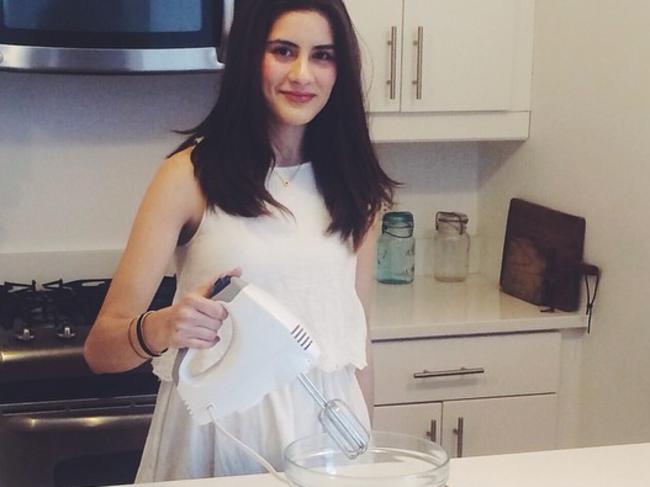
The owners of bulk shop, the Wasteless Pantry in Perth, were also careful to create an environment aimed at the mainstream, and not just “alternative types”.
“It’s not a hippy subject anymore and ... we didn’t want to be branded as alternative, we are a store where the mainstream can shop in a different way,” co-owner Amanda Welschbillig said.
Their clients include a broad cross-section of people including mums and the elderly, who love the shop because they can buy small amounts of the things they need.
People can bring their own jars and containers, or use ones provided, to shop for dry goods including flour, rice, pasta, nuts, spices, snacks and other goods.
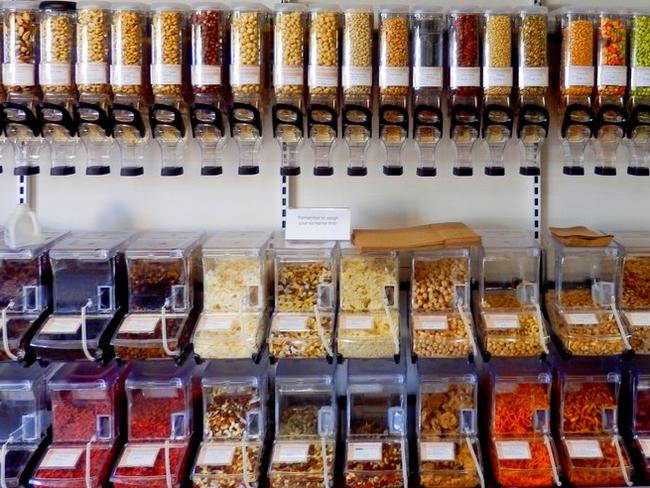
By enabling people to buy only what they need, it’s hoped they won’t need to throw food away.
Planet Ark head of campaigns Brad Gray said food waste generally made up between 40 and 50 per cent of the average garbage bin.
“If we can do something to reduce food waste and divert to other uses, we can get close to zero waste,” he said.
PROBLEM WITH RECYCLING
Major companies are also recognising the appeal of this type of living and are increasingly offering ways to recycle their product packaging.
A zero waste lifestyle involves producing no landfill but there’s still a lot of things that councils can’t recycle, and this varies from council to council. This can include plastic bags, coffee pods, straws, the blister packs that tablets come in, condoms and toothpaste tubes.
So companies including Jurlique, Nespresso, Australia Post and Coles have begun offering customers the ability to recycle their products.
Recycling has even become a worldwide business with TerraCycle, a company that recycles hard-to-recycle items, launching in Australia in 2014. It started in the US in 2001 and is now in 21 countries.
“The TerraCycle philosophy is to eliminate the idea of waste,” TerraCycle communications manager Ausseela Thanaphongsakom said.
In Australia it allows people to recycle yoghurt pouches, used mail satchels and other dental products for free. While the company has only just established itself in Australia, in other countries it even offers recycling of things like chewing gum.
“I think (the companies) perceive, rightly so, that consumers would appreciate and are demanding such programs,” TerraCycle founder and chief executive officer Tom Szaky told news.com.au.
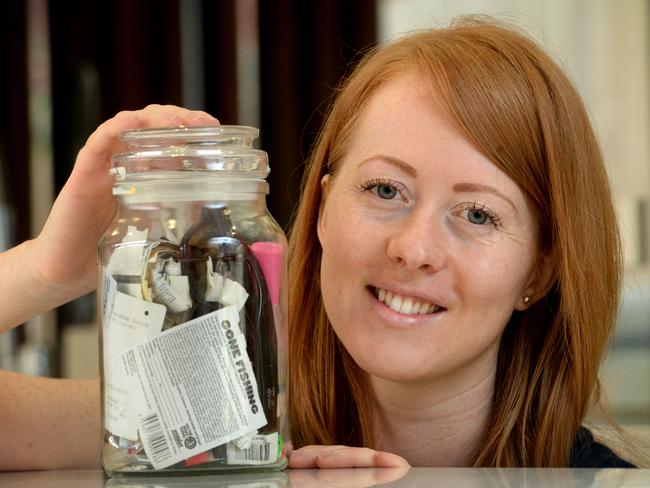
Pretty much everything is recyclable, Mr Szaky explained, but the problem is making it into a product that people wanted to buy. This is because most products, especially plastics, can only be “downcycled”. A plastic toothbrush can’t be recycled into a new plastic toothbrush, for example.
This is in contrast to metal, which can be recycled endlessly, and paper, which can be recycled seven times.
Most plastics are recycled into things like park benches and garden materials. Part of TerraCycle’s business is creating a market for these recycled products.
Mr Szaky said he thought Australians had less opportunity to recycle things, compared with other countries, because of a lack of infrastructure. This applied even to more profitable materials such as glass and paper.
But he acknowledged that the ideal situation was not to consume.
“That’s the fundamental answer, don’t buy this stuff to begin with. But if you chose to buy, as many do, the best thing is to buy things that you can reuse.”
HOW TO START
Lindsay Miles advised those wanting to try zero waste living, to start by making small changes and not to overthink things.
“Starting is the easy thing, just take a water bottle with you when you go out,” Ms Miles said.
Instead of using disposable coffee cups, bring your own reusable one instead. Australians have been estimated to use one billion disposable coffee cups each year.
Bringing your own bags when buying fruit and vegetables, purchasing from local markets and bulk food shops will also make a big difference to your trash can.
“I reckon 80 per cent of plastic is easy to get rid of,” Ms Miles said.
One thing Ms Miles noticed when she started shopping this way was how much of a “sucker to marketing” she was.
“I stopped buying a lot of junk food like potato chips just because they were on offer. I was buying a lot less junk and eating better.”
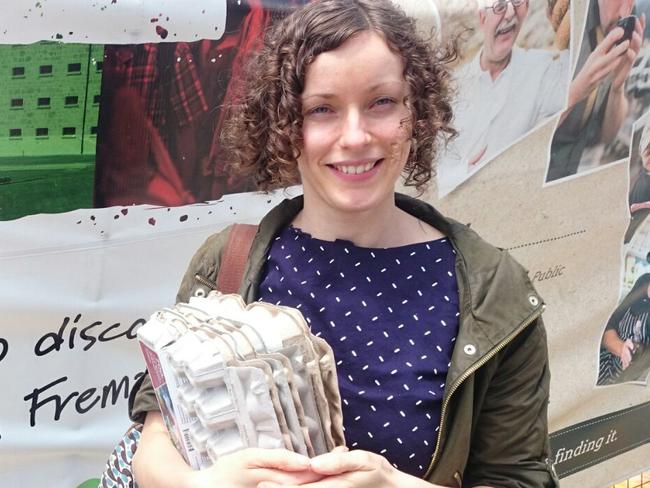
Finding a community garden where you can drop off your vegetable scraps will also make a big difference. You can store scraps in the freezer until disposing of them.
“We throw away something like 38 per cent of food waste, if we can compost that, you’ve almost halved what you’re chucking in the bin,” she said.
Once you have mastered the basics, you can start looking at some of the tougher products.
There are many YouTube videos on how to make cosmetics, one of the hardest things to buy without generating waste.
Ms Rhoads makes her own mascara to avoid buying commercial products packaged in plastic. She uses various oils stored in glass containers to moisturise.
“I make my own mascara and my lipgloss is in a compostable tube,” she said.
“But no one notices (I live zero waste) until I tell them. I still look the same as I used to look.”
She said the biggest change was that she didn’t feel like she needed to keep up with trends anymore and had “stepped out of the consumerist bubble”.
“I don’t buy clothes to stay on trend, I don’t change my house, I’m a lot more comfortable, my life doesn’t feel as rushed anymore by the advertising industry.
“I guess I feel more in line with how the planet works, and taking it slow. I guess I feel a lot more peaceful.”
RECYCLING TIPS:
To figure out what you can recycle based on your council area, you can download a free app from Planet Ark.
City of Melbourne councillor Arron Wood said 10 per cent of stuff placed in recycling bins could not be recycled and there was often confusion about plastic items.
Policies also vary between councils so it’s best to check.
“All hard plastic bottles or containers (including shampoo or detergent bottles, ice cream and takeaway containers) can be recycled, regardless of whether there is a recycling symbol or number on the item,” he said of Melbourne’s program.
“Rigid household plastic items such as kitchen storage containers or plastic toys can also be recycled.”
But plastic bags and plastic wrapping cannot be recycled, and another common mistake was for people to place recyclables in plastic bags.
“These items cannot be recycled because the bags cannot be opened at the sorting facility due to occupational health and safety concerns,” he said.
Melbourne Council said it sent 23,000 tonnes of waste to landfill in 2014/15. But only 8000 tonnes was collected for recycling or composting.
Those who want to recycle plastic bags and any other soft plastics such as empty bread, cereal and frozen food bags can put them in specially-marked bins at Coles.
These bags are then turned into outdoor furniture for community groups including primary schools and preschools.
Mobile phones can be recycled via MobileMuster, Australia’s official, not-for-profit government accredited mobile phone recycling program.
TERRACYCLE RECYCLING PROGRAM
Items that can be recycled for free include:
Colgate Oral Care Brigade: used toothbrushes, toothpaste tubes, floss containers and outer packaging
Nescafé Dolce Gusto Capsules Brigade: only Nescafé Dolce Gusto are accepted.
Whole Kids Snack and Pouch Brigade: snack wrappers and yoghurt pouches.
Australia Post Mailing Satchel Brigade: Mailing post satchels.
Natures Organics Cleaner Packaging Brigade: nozzles, triggers, on cleaning, beauty and laundry products, beauty wipe packaging
Nespresso Capsules Brigade: only Nespresso capsules are accepted and can be dropped off at participating florists and garden centres.
Loccitane Recycling Program: Its products can be dropped at participating stores.
For more information on the free recycling program go to: www.terracycle.com.au/en-AU/brigades
You can also purchase zero waste boxes to recycle other items: www.terracycle.com.au/en-AU/zero_waste_boxes



